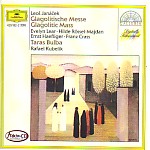The Bavarian Radio Symphony Orchestra may not be the Czech Philharmonic, but it plays its collective heart out for Kubelik, who understands as well as anyone the authentic Janácek style. Those abrupt endings cut off with idiomatic suddenness, and there’s no effort to smooth out the sometimes rough textures or create continuity where the composer intended none. The orchestra’s bright trumpets ring out brilliantly both in the opening of the Mass and in the first-movement battle scene in Taras Bulba–and certain orchestral details such as the latter work’s organ part, or the evocative harp writing in the second movement, never have been realized more successfully.
A uniformly robust and healthy quartet of vocal soloists, an important and very rare asset on disc, is not the least of the Mass’s attractions. No one plays moments like the end of the Credo with such grandeur or total lack of pretension. The sonics are typical of DG of the period: a bit tinny, but otherwise clean and clear. These performances have been available in many different couplings over the years, and this Arkivmusic.com “on demand” production (original cover art, no notes or texts) should keep them so for a good long time. [11/21/2006]
































